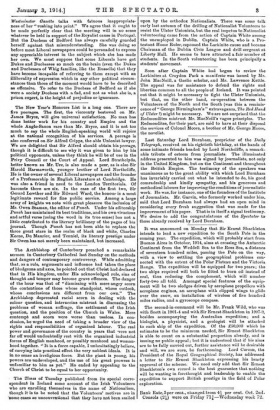The Archbishop of Canterbury preached a remarkable sermon in Canterbury
Cathedral last Sunday on the methods and dangers of contemporary controversy. While admitting that, as a rule, arguments and influence had taken the place of bludgeons and axes, he pointed out that Christ had declared that in His kingdom, under His acknowledged rule, sins of thought and temper may become grave offences. The danger of the hour was that of "dismissing with mere angry scorn the contentions of those whose standpoint, whose outlook, whose conclusions are different from our own." The Archbishop deprecated racial scorn in dealing with the colour question, and internecine mistrust in discussing the problems of woman suffrage, the settlement of the Irish question, and the position of the Church in Wales. Mere contempt and scorn were worse than useless. In con- clusion, he urged the need of taking a broader view of the rights and responsibilities of organized labour. The real power and governance of the country in years that -veto not far off would undoubtedly rest with the organized industrial forces of English manhood, or possibly manhood and woman- hood together. "It is a force capable, I unhesitatingly believe, of carrying into practical effect the very noblest ideals. It is in no sense an irreligious force. But the giant is young, his powers are undeveloped, and the use of his great prowess is unfamiliar to him as yet." He ended by appealing to the Church of Christ to be equal to her opportunity.


















































 Previous page
Previous page